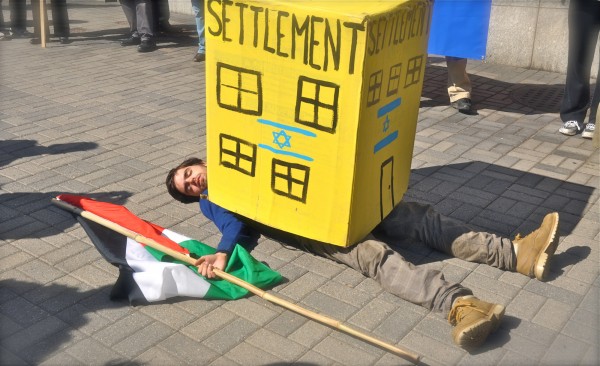
A protester depicts the impact of illegal Israeli settlements on Palestinians.
Today Palestinian top negotiators will meet with United States Secretary of State John Kerry’s team in Washington to go over the U.S. position on all the issues that will be a part of a framework agreement that Kerry aims to share publicly in a few weeks.
A senior Palestinian source told Haaretz, “we want to clarify what the 1967 borders are from the Americans’ standpoint, and how they see the status of Jerusalem as the Palestinian capital, and another long list of things including security issues.”
The Palestinian newspaper Al-Quds reported on Monday that Saeb Erekat, who is the chief Palestinian negotiator, expects to receive a written document from the Americans detailing their ideas about any future agreement. In turn, Erekat will provide a list of “gross Israeli violations” that he says are attempts to determine facts on the ground and are disrupting the terms of the negotiating process.
Israeli Prime Minister Benjamin Netanyahu remains under fire from his own coalition after an official in Netanyahu’s office was quoted in a Times of Israel news report saying that the Prime Minister will insist that Jewish settlers in the West Bank have a right to remain under Palestinian rule in any future peace deal. Naftali Bennet, Israeli Economy Minister and a key pro-settlement partner in his coalition, attacked Netanyahu for his idea; “The idea of Jewish settlements under Palestinian sovereignty is very dangerous and reflects an irrationality of values,” Bennet wrote on his Facebook page. Netanyahu responded to Bennet’s comments by saying that he was only trying to “expose the true face of the Palestinians” and Netanyahu’s office said late Sunday that “nothing shows the Palestinian Authority’s unwillingness to reach an accord with Israel more than their extreme and reckless reaction to an unofficial report.”
In response to the “trial balloon” proposed by Netanyahu, Erekat said, “anyone who says he wants to keep settlers in the Palestinian state is actually saying that he doesn’t want a Palestinian state. No settler will be allowed to stay in the Palestinian state, not even a single one, because settlements are illegal and the presence of the settlers on the occupied lands is illegal.”
The U.S. has refused to weigh in on the back-and-forth blame game triggered by Netanyahu’s office. State Department spokeswoman Jen Psaki only offered vague responses when asked to comment on the issue, honoring the U.S. negotiation team’s request to remain silent about all details of the peace talks between the Israelis and Palestinians.
J Street, however, did not hesitate to voice its opinion that Netanyahu’s suggestions risked derailing the ongoing negotiations. Jeremy Ben-Ami, J Street President, called upon Netanyahu’s government to “act swiftly to clarify that it is not engaged in these negotiations simply to expose deficiencies on the other side, but is seriously prepared to make the sacrifices and compromises—including settlement evacuation—that will be necessary to secure Israel’s future.” Ben-Ami accused members of Netanyahu’s office of “making matters worse” when they accused Netanyahu’s critics of interfering with the Prime Minister’s effort “to reveal the true face of the Palestinian Authority” as an unwilling peace partner.
Against this backdrop, the Palestinians are now in a position to make drastic gestures towards peace. They can either choose to use their time in Washington to vent about Netanyahu’s latest attempt at finger pointing, or they can try to bridge the gaps between the U.S. envisioned peace equation and their own and agree to move forward. This is a real opportunity to show Netanyahu, the Israelis, the U.S., and the world that the Palestinian leadership is a partner for peace and put the pressure on Netanyahu to follow suit.